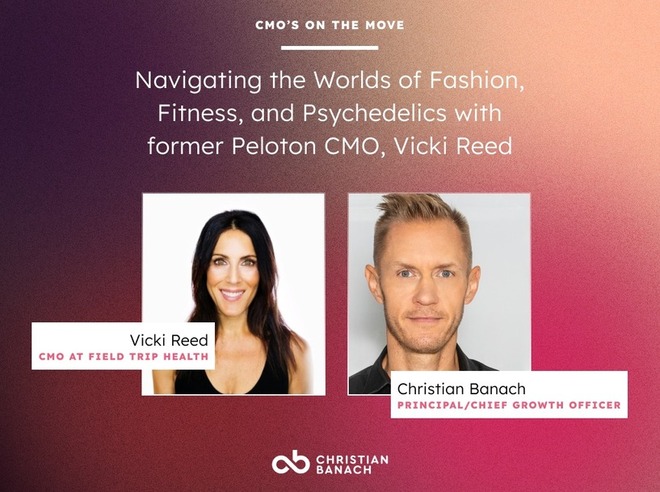CMO Interviews
Navigating the Worlds of Fashion, Fitness, and Psychedelics with former Peloton CMO, Vicki Reed



After serving in roles at Nike, DKNY, and Tommy Hilfiger and being Appointed Chief Growth Officer at FieldTrip Health, Vicki Reed now runs VII Consulting. Atypical for most CMOs, Reed is also an academic working in psychoanalysis. Working with Wieden+Kennedy when she was at Nike, Reed understands how small, boutique agencies can capture the attention of a household brand.
Christian Banach sat down with this dynamic expert on human behavior to discuss how agencies get on her radar, the value of reflection for communicators, and her experience working with U2’s Bono.
Where to find Vicki Reed: LinkedIn
Where to find Christian Banach: LinkedIn
Banach:
Tell me something nobody else knows about you.
Reed:
I always thought myself to be really introverted and quite quiet and bookish, and that’s kind of the way I started off the first part of my life, and it’s still a big part of me.
But one of the things that I have learned is that two things can be true at one time. People have learned a lot from Susan Cain and her conception of the “Introverted Leader.”
In short, it’s the idea that a person that is quiet and can be somewhat introverted can also be a leader, despite the public perception that CMOs, as communicators, are bubbly and extroverted.
Banach:
Tell me a little more about your working history.

Reed:
I started my career working at Nike and I was one of those homegrown kids from Oregon that “got lucky”—I landed a job at Nike at age 22. And it was not only at Nike: it was the advertising department of Nike in the early ‘90s. I did a stint with LVMH when I moved to New York and was eventually approached to work with a small company owned by Bono and his Wife Ali, who were manufacturing brands with sustainable ideas and sourcing from Africa.
When I joined Peloton it was a giant learning curve, but the experience really set me off on other things within the fitness industry and the emerging space of digital fitness.
Since leaving Peloton, I’ve been in school studying for a while, getting my licensure in psychoanalysis and doing consulting.
Banach:
That’s great…a lot to unpack there. Tell me a little more about Bono!
Reed:
I worked with Ali, his wife, more on a day-to-day basis, but both are wonderful.
For Bono, I think when you speak with them, you know that you’re in the presence of somebody who’s very intelligent, deeply sensitive and really hears and sees you. He can do pretty dead-on imitations of almost anybody he meets within a short period of time. He does really see you!

Banach:
We were speaking before the interview about the “monogamous relationship” between long time partners Nike and Wieden+Kennedy. Can you say more about that?
Reed:
It’s funny because at the time I didn’t really question that it was a “monogamous relationship,” though that is accurate. People could come and go, but we almost forgot “we were a client, and they were an agency,” if that makes sense. We were in the headspace of just “produce produce produce” back then, and it really engendered a sense of camaraderie.
Banach:
How did Wieden develop a culture that led to that long-lasting partnership? Were they doing something that set them apart?
Reed:
People often said there was always something about being out in Oregon and Portland for Wieden that made them special. There was a certain freshness and naivety about being an agency in Portland that defined itself against the New York City “Mad Men” ad scene. It allowed it to be fresh and innocent and fostered a spirit of “do the right thing,” to quote Spike Lee.
That’s easier said than done in a world where there are competing pressures, budgets, people, politics and the “business of the business.” It comes down to understanding what makes your agency unique and playing to that strength. Finding your own creative spirit and what works to bring it to the surface.
Banach:
Where do you go to stay on top of industry trends and news?
Reed:
I do the digital New York Times. I like Business Insider, and last year I’ve been reading a lot of psychedelic newsletters, because that was industry specific to what I was working in.
I spend more time now than ever before understanding the economy from the perspective of a senior-level role. It’s not just about fun ads and digital placements; it’s what’s happening in the bigger picture. Asking questions like: what’s happening with spending or taxes? How that is going to affect my product? A CMO really starts to think a little bit like an economist.
Sign up to our newsletter for exclusive access to CMO interviews and job changes.
Banach:
Can you share something you wish agencies knew about the CMO role?
Reed:
Some agencies get assignments, and they think that as a CMO I want to “hand away my baby.” I don’t want to do that. I want to collaborate with or riff off somebody to develop a great strategy. Sometimes agencies come to you with all this stuff they’ve produced in this “hands-off” way and it’s interesting and great, but still missing the element of collaboration.
I didn’t hire you because I wanted you to do all the work for me.
Banach:
Are there any things that you’ve seen an agency do that really cut through and got them on your radar screen?
Reed:
Now in a senior role, I would say yes. I have been absolutely surprised by the occasional person who reaches out and says something incredibly relevant to me, especially about my product.
In the psychedelic space, for instance, there could be someone who reached out because they have a family member or friend who has mental health challenges. A real story about the product and what it means to someone sticks with me.
Banach:
Any common “mistakes” you see agencies making that you could comment on?
Reed:
I think sometimes, especially when working with small or early-stage companies, agencies can get myopic about budgets. They know what they are capable of, but [they] don’t necessarily consider what a company at that stage needs or even has the capacity for.
But that is part of doing your homework—budgets aren’t that big of a mystery. Look at the size of a company, then imagine what their marketing spend is going to be. You can then “work backwards” and get a good idea of what they might be able to spend on an agency or what they have to spend in their marketing budget. It’s not a precise formula, but it’s easy to figure out.
If you’re surprised—you shouldn’t be surprised.
Banach and Reed covered several other topics, ranging from social media in the modern age, to the works of Freud and his students.
Sign up to our newsletter for exclusive access to CMO interviews and the latest job changes.
Edited for brevity and clarity.
 Back
Back
Sign up now! Every Monday, get breaking news of recent CMO appointments, motivation to start your week positively, and innovative business development insights.